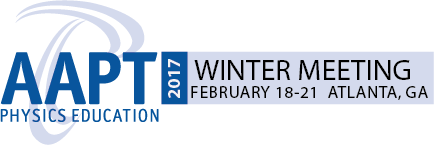Did you know?
Stone Mountain outside Atlanta is one of the largest blocks of exposed granite in the world. — www.yahoo.com
2017 Winter Meeting Workshops
Listed below is a current list of workshops planned for the 2017 Winter Meeting. It is recommended that you register early for your workshops. Some workshops will fill-up early and others may be cancelled due to low enrollment. Some details are subject to change.
Location
Most workshops and tutorials will be held at Georgia Institute of Technology (Georgia Tech). Click here to view a map of campus. W15 will be held at Spelman and some tutorials will be held at the conference hotel, the Marriott Marquis Atlanta (T02, T03 and T04). Please be sure to check the program book before you board the bus.
Registration
You must pick-up your registration packet at the AAPT registration desk at the Marriott Marquis Atlanta before heading to the University. You will not be allowed on the bus unless you are confirmed for a workshop.
Transportation
Transportation will be provided. Buses will depart the Marriott on the International Level at the Courtland Street Exit. Please click here for a shuttle bus schedule.
Campus Map
Please click here for a map of campus identifying workshop building.
Find out more and become a part of WM2017 on: Facebook| Twitter
Some photos courtesy of FreeStockPhotos.biz


